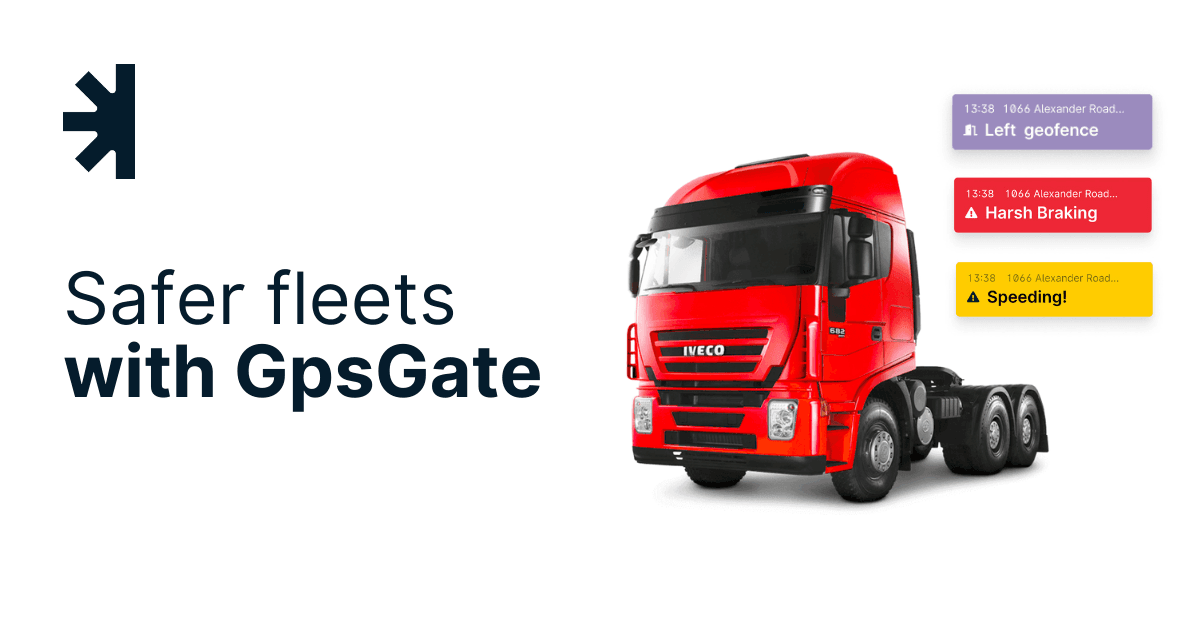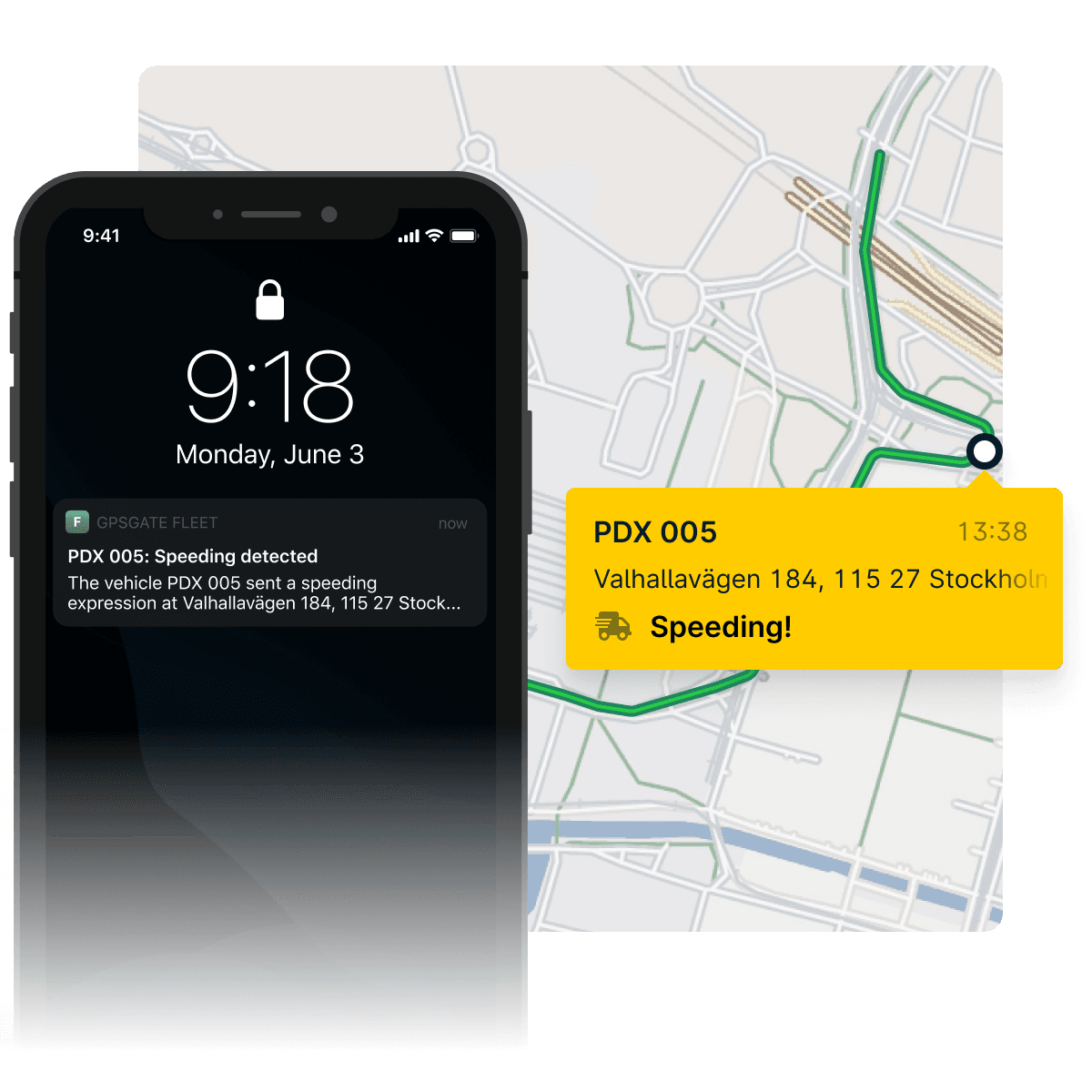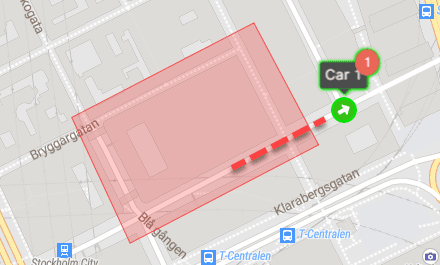5 ways to increase fleet safety with GpsGate
Driving is one of the most dangerous things you can do. More daring than taking a flight, more likely to cause serious injuries than skydiving... and yet, vehicle fleets are out on the streets 24/7. So, what are the biggest threats to fleet safety and how can you manage them?
Behaviors like speeding, harsh braking, or accelerating affect commercial fleet safety. With unsafe driving, the likelihood of accidents and injuries increases. Moreover, fleet managers want to protect cargo and the drivers who transport it. GpsGate's real-time alerts, SOS notifications, and route geofences allow fleet managers to check in on drivers. When an abnormality in a driving route occurs, it's important to find out why - as quickly as possible.
At GpsGate, we put together a list of 5 ways that our fleet tracking platform keeps drivers, cargo, and fleet vehicles safe.

Curious about GpsGate? Try it for free.
1. Real-time alerts when fleet vehicles speed
Drivers speed for a number of reasons. Racing to beat a red light or complete a delivery, even unconscious speeding caused by fatigue or distractions. The National Safety Council estimates that drivers are 4 times more likely to crash a vehicle while using a cell phone, either for work or personal use. In commercial situations, employers are liable to fines up to $25 million. Beyond that, repairs can render a vehicle unusable for days, or even weeks. Regardless of the reason, driving in a hurry is a dangerous behavior that can lead to accidents and serious costs to your operations.
Monitoring speed in urban areas
When fleet vehicles enter areas of high pedestrian traffic, like urban walking streets, it’s especially important to monitor their speed. Our GPS tracking platform can help you track individual and fleet vehicle speeding with:
- real-time odometer readings
- speeding alerts in-app or via SMS
- historical speeding reports to target trends

2. Identify harsh driving
Harsh driving is another unsafe fleet practice. This includes quick braking, acceleration, and turns. Harsh braking happens when a driver uses more force than necessary to stop the vehicle. Rapid acceleration is the opposite - a fast increase in speed. Not only are these tendencies dangerous but they can be costly.
- accidents can result in fines and higher insurance premiums
- vehicle wear and tear with higher maintenance costs
- harsh braking and acceleration can use up to 40% more fuel
- unexpected breakdowns that cause delays for end customers
Similar to speeding notifications, GpsGate’s fleet management software generates harsh driving alerts.
3. Receive SOS notifications
Breakdowns and accidents happen. When drivers encounter safety issues on the road, fleet operators need to act quickly. Although it’s not fun to think about your drivers in trouble, it’s crucial to have an emergency alert system in place so all members of the fleet can get help when they need it.
Using GpsGate in concert with a tracking device that has an SOS capability helps keep drivers safe in emergency situations. As soon as the driver hits the SOS button, it sends an alert to the control center, and an operator can immediately contact the driver. Using GpsGate in this way gives fleet managers an exact, real-time location of the vehicle.
4. Protection against cargo hijacking
When transporting high-value goods, vehicle hijacking is a real concern. This places drivers at risk each time they clock in for work. With hijackers using advanced technology, it’s important to have a strong system in place to prevent expensive cargo and vehicle loss.
Hijackers often use signal jammers to hinder a GPS tracking device’s ability to communicate. A GPS jammer is a small transmitter that sends out high-powered radio frequencies. Luckily, many GPS tracking devices come with jammer detection. When using this type of device with GpsGate, the system warns operators and managers of threats in real-time so that they can communicate with the driver.
Further GpsGate features to use to avoid hijacking:
- create route geofences to flag unexpected route changes
- alert operators if a vehicle has been idling for too long
- SOS vehicle alarms to trigger the monitoring center
Last-mile recovery services use GpsGate to ensure the driver has no issues safely reaching their final destination.

5. Reports for driver training
Real-time alerts increase safety in day-to-day operations. GpsGate reports, on the other hand, can detail harsh driving, fuel usage, and other behavior monitoring to help fleet managers address safety in a proactive way. Building a driver training program based on actual data from your fleet will make the biggest impact. After training, continued use of reports helps provide a benchmark for improvements.
GpsGate's click and download reports measure:
- fuel levels and usage
- harsh driving over time
- excessive idling
- eco-driving efforts

Ready to increase fleet safety with GpsGate? Get in touch with us!
GpsGate’s vehicle tracking platform helps you monitor the behavior that matters most to you – fuel usage, harsh braking, excessive idling, and speeding. Dialing in on fleet behaviors will increase fleet safety and productivity.
- acceptCookies - We use this cookie to remember if you have closed this window or not.
- country - We use this cookie to serve you country-specific data.
- gg_sessionId - This cookie helps us debug sign-up issues and general errors.
You can read more about cookies and privacy here.